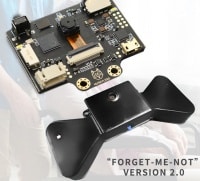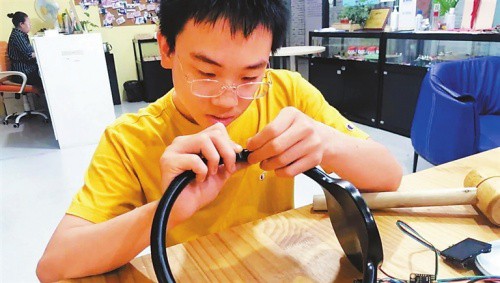A 15-year-old Chinese teenager from Hangzhou recently came out with the second version of his “forget me not” wearable, which is designed to help people with Alzheimer recognise their family members and guide them home through a built-in voice assistance.
Lu Yuan from Hangzhou became a viral sensation on China’s social media in November last year for creating an AI-based smart collar for his grandmother who is suffering from the early stages of the neurodegenerative disease.
To date, China has the highest number of people with Alzheimer’s disease at 10 million, the number is estimated to reach 45 million by 2050.
Built-in AI Vision sensor
The latest version of the smart wearable uses Arduino Nano and is equipped with a built-in HuskyLens AI Vision Sensor developed by DFRobot, a Shanghai-based robotics and open source hardware provider established in 2008.

The wearable’s AI vision sensor comes with an MP3 module and use Mind+ for programming. It adopts the built-in machine learning technology to identify human faces. With a simple click, HuskyLens can complete the AI training to recognise a new face.
Engineered with a built-in UART or I2C interface, HuskyLens can seamlessly dock with Arduino Nano. If the wearable recognises a recorded face, it will control the MP3 module, and tell the Alzheimer's patients through the earpiece whom they are talking to, along with other bits of information.
Furthermore, the built-in sensor can sense the intensity of ultraviolet rays to tell Alzheimer's patients whether they are indoors or outdoors. If a wearer is outdoors for 20 minutes or longer, the device will issue a “go back home” reminder while simultaneously giving the home address.
Getting the wearables to more people
The personal story behind the creation of the Forget Me Not wearable made headlines for its 15-year-inventor.
In news reports recounting the invention of the Forget Me Not wearable, Lu said he spent two weeks working from the initial drafts to the final design. The student from the Hangzhou Baochuta Experimental School was helped by teacher, Lin Ying, who was pleased to see her pupil combined several techniques into practice and used the facial recognition to help a particular solve problem.
"I hope the device could function as good company of my grandma because the Alzheimer's patients need the company," Lu told CGTN last November, adding that he will make continue to upgrade the device and hopes to obtain a patent to help more patients.
Li Xia, a medical director of Shanghai Mental Health Center, who has documented what life is like for Alzheimer's patients in a news documentary, said the Forget Me Not wearable can help Alzheimer's patients with memory impairment/
"The family and community play a very important role in helping people with Alzheimer's disease. If the family finds some early symptoms, they could have doctors involved in to reduce symptoms," Li said in the CGTN article.



